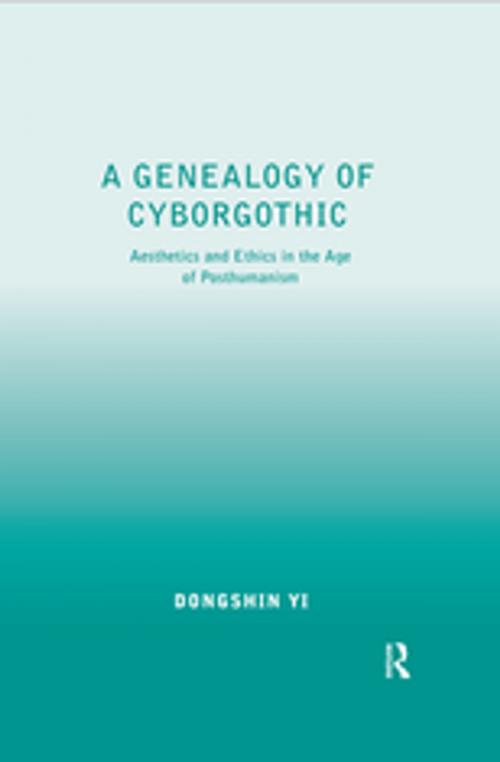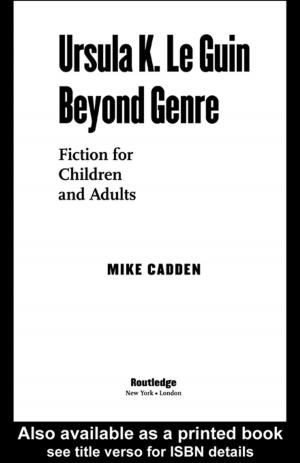A Genealogy of Cyborgothic
Aesthetics and Ethics in the Age of Posthumanism
Fiction & Literature, Literary Theory & Criticism| Author: | Dongshin Yi | ISBN: | 9781351962506 |
| Publisher: | Taylor and Francis | Publication: | March 2, 2017 |
| Imprint: | Routledge | Language: | English |
| Author: | Dongshin Yi |
| ISBN: | 9781351962506 |
| Publisher: | Taylor and Francis |
| Publication: | March 2, 2017 |
| Imprint: | Routledge |
| Language: | English |
In his provocative and timely study of posthumanism, Dongshin Yi adopts an imaginary/imaginative approach to exploring the transformative power of the cyborg, a strategy that introduces balance to the current discourses dominated by the practicalities of technoscience and the dictates of anthropocentrism. Proposing the term "cyborgothic" to characterize a new genre that may emerge from gothic literature and science fiction, Yi introduces mothering as an aesthetic and ethical practice that can enable a posthumanist relationship between human and non-human beings. Yi examines the cyborg's literary manifestations in novels, including The Mysteries of Udolpho, Frankenstein, Dracula, Arrowsmith, and He, She and It, alongside philosophical and critical texts such as Edmund Burke's A Philosophical Enquiry into the Origins of Our ideas of the Sublime and Beautiful, Immanuel Kant's Critique of Judgment, John Stuart Mill's Utilitarianism and System of Logic, William James's essays on pragmatism, ethical treaties on otherness and things, feminist writings on motherhood, and recent studies of posthumanism. Arguing humans imagine the cyborg in ways that are seriously limited by fear of the unknown and current understandings of science and technology, Yi identifies in gothic literature a practice of the beautiful that extends the operation of sensibility, heightened by gothic manifestations or situations, to surrounding objects and people so that new feelings flow in and attenuate fear. In science fiction, which demonstrates how society has accommodated science, Yi locates ethical corrections to the anthropocentric trajectory that such accommodation has taken. Thus, A Genealogy of Cyborgothic imagines a new literary genre that helps envision a cyborg-friendly, non-anthropocentric posthuman society. Encoded with gothic literature's aesthetic embrace of fear and science fiction's ethical criticism of anthropocentrism, the cyborgothic retains the prospective nature of these genres and develops mothering as an aesthetico-ethical practice that both humans and cyborgs should perform.
In his provocative and timely study of posthumanism, Dongshin Yi adopts an imaginary/imaginative approach to exploring the transformative power of the cyborg, a strategy that introduces balance to the current discourses dominated by the practicalities of technoscience and the dictates of anthropocentrism. Proposing the term "cyborgothic" to characterize a new genre that may emerge from gothic literature and science fiction, Yi introduces mothering as an aesthetic and ethical practice that can enable a posthumanist relationship between human and non-human beings. Yi examines the cyborg's literary manifestations in novels, including The Mysteries of Udolpho, Frankenstein, Dracula, Arrowsmith, and He, She and It, alongside philosophical and critical texts such as Edmund Burke's A Philosophical Enquiry into the Origins of Our ideas of the Sublime and Beautiful, Immanuel Kant's Critique of Judgment, John Stuart Mill's Utilitarianism and System of Logic, William James's essays on pragmatism, ethical treaties on otherness and things, feminist writings on motherhood, and recent studies of posthumanism. Arguing humans imagine the cyborg in ways that are seriously limited by fear of the unknown and current understandings of science and technology, Yi identifies in gothic literature a practice of the beautiful that extends the operation of sensibility, heightened by gothic manifestations or situations, to surrounding objects and people so that new feelings flow in and attenuate fear. In science fiction, which demonstrates how society has accommodated science, Yi locates ethical corrections to the anthropocentric trajectory that such accommodation has taken. Thus, A Genealogy of Cyborgothic imagines a new literary genre that helps envision a cyborg-friendly, non-anthropocentric posthuman society. Encoded with gothic literature's aesthetic embrace of fear and science fiction's ethical criticism of anthropocentrism, the cyborgothic retains the prospective nature of these genres and develops mothering as an aesthetico-ethical practice that both humans and cyborgs should perform.















